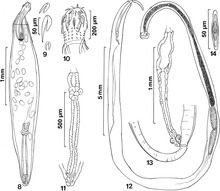Palaeacanthocephala ("ancient thornheads") is a class within the phylum Acanthocephala. The adults of these parasitic platyzoans feed mainly on fish, aquatic birds and mammals. This order is characterized by the presence of lateral longitudinal lacunar canals and a double-walled proboscis receptacle.[1] The nuclei of the hypodermis (outer layer of skin) are fragmented and the males have two to seven cement glands, unlike their relatives the Archiacanthocephala, which always have eight.
| Palaeacanthocephala | |
|---|---|

| |
| Proboscis of a Rhadinorhynchus species | |
| Scientific classification | |
| Domain: | Eukaryota |
| Kingdom: | Animalia |
| Phylum: | Acanthocephala |
| Class: | Palaeacanthocephala Meyer, 1931 |
| Order | |

There are three orders in the class Palaeacanthocephala:[2]
- Echinorhynchida Southwell and Macfie, 1925
- Heteramorphida Amin and Ha, 2008
- Polymorphida Petrochenko, 1956
References
editWikispecies has information related to Palaeacanthocephala.
- ^ Bursey, C. R., Goldberg, S. R., & Kraus, F. (2007). New family, new genus, new species of Acanthocephala (Echinorhynchida) from the lizard, Sphenomorphus granulatus (Sauria: Scincidae), from Papua New Guinea. Open Parasitology Journal, 1, 41-44. Found at: https://benthamopen.com/contents/pdf/TOPARAJ/TOPARAJ-1-7.pdf
- ^ "ITIS - Report: Palaeacanthocephala".